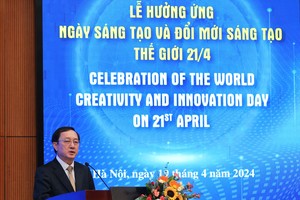
Deputy Minister of Information and Communications Nguyen Huy Dung stated that the most prominent difference between digital technology and others lies in the fact that it connects people and things to jointly address problems of the real life. Only when the whole society collaborate with one another can the digital transformation process become a success.

Leading IT businesses are playing the pioneer role in researching and developing digital platforms for several aspects of agriculture, healthcare, education, traffic, energy, and tourism. Innovative startups are then encouraged to tackle other problems in Vietnam using digital technology and breakthrough operation models.
For the general public to get familiar with the digital environment, this technology must become an essential and popular service that is the cheaper the more people use. Digital platforms such as telecoms facilities, cloud computing, AI, digital identification and authentication, big data are helping to provide the community with cheap services in the fields of electricity, water, telecoms. When welcomed wholeheartedly, digital technology will ignite other related manufacturing and trading activities.

Chairman of Vietnam Software and IT Services Association Nguyen Van Khoa informed that by 2025, Vietnam aims to have its digital economy contribute 20 percent to the national GDP and the proportion of this sector account for at least 10 percent each field. The figures for 2030 must reach 30 percent and 20 percent respectively. To fulfill this goal, all classes of the society, especially businesses, must try their best cooperatively besides the determination of the Government.
At present, key regions like Hanoi and Ho Chi Minh City are building programs to develop their own digital economy based on their advantages. They would become a good reference for other localities and state agencies.

Director Phan Phuong Tung of the HCMC Support and Consultation Center for Digital Transformation (DXCenter) said that the city has already identified digital transformation as the key process to boost the growth of digital economy and innovation. With the largest number of operating businesses in the nation (about 268,000 enterprises), HCMC is a lucrative and promising market for companies offering digital transformation solutions and consultation. This, in turn, is expected to help small and medium-sized enterprises (SME) to boost their capacity and competitiveness.
Many businesses in the city have applied digital technology in their trading and marketing plans, distribution channel management, and even product creation. However, SMEs are still facing challenges implementing digital solutions owing to financial and infrastructure limits, old trading habits. Therefore, HCMC is proposed to introduce more policies to support them accelerating this process in their premises.

Director Tran Van Khanh of Le Van Thinh Hospital in Thu Duc City commented that digital solutions offer a transparent, modern, and professional working environment. This helps to improve the skills and awareness of employees in the hospital, while allowing them to perfect their routines and avoid medical incidents, in turn increasing the service quality of the hospital and the satisfaction of its patients.
So far, the hospital has gradually applied digital transformation in building its electronic medical records and boosting its services. However, it still encounters financial trouble. For instance, the financial mechanism for the implementation of IT in the medical field is still unclear. Thus, the Director hoped that the IT Authority under the Health Ministry needs to identify the precise situation at each locality (infrastructure, current services, budget) to develop and impose circulars so that the implementation of IT in this field is smoother.

CEO of KardiaChain Huy Nguyen said that the application of blockchain in the digital transformation process can greatly reduce overhead costs and human resources for businesses while increasing the performance of data exchange and authentication.
Blockchain can be used widely in both agriculture and industry for automation and improvement in quality control performance, supply chain supervision via product traceability. Logistics can also take advantage of this blockchain technology to better manage warehouses, cargo input-output, transport contract information access. However, the most successful implementation of blockchain lies in the financial field thanks to its strong security and transparence features, which is favorable among banks when authenticating transactions.
Obviously, blockchain is considered one of the key technologies in Industry 4.0, and proposals on legal frameworks for its application have increasingly appeared to help it enter the daily life of the community in the most convenient manner. With proper investment and correct development direction, blockchain can offer a multi-function platform with a reasonable price for all aspects of life, greatly accelerating the digital transformation process in Vietnam and turning the country into a more competitive one in the region.
























